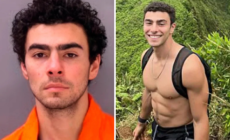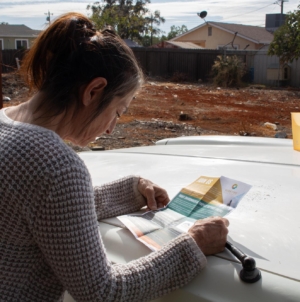-
Overdraft fees would be slashed under new Biden administration rule - 10 mins ago
-
Months Before C.E.O.’s Killing, the Suspect Went Silent. Where Was He? - 11 mins ago
-
Vegetable Recall Update As FDA Issues Most Serious Concern Level - 27 mins ago
-
Suspect in Oroville school shooting sat in San Bernardino County jail weeks earlier but was released - 50 mins ago
-
British Pubs Are Running Out of Guinness - 55 mins ago
-
NBA Executive Sees Surprising Landing Spot For Lakers Star LeBron James - about 1 hour ago
-
Authorities raid 45-ton, $100-million marijuana stash in California - 2 hours ago
-
Is Luigi Mangione Getting Fan Mail in Jail? - 2 hours ago
-
Let’s Talk About Pornography. No, Seriously. - 2 hours ago
-
7.0 quake prompts endangered Death Valley fish species to get busy - 2 hours ago
‘You don’t know what’s next.’ International students scramble ahead of Trump inauguration
As an international student at USC who had not been home for a year, Kevin Lu was excited to return over winter break to see his parents in the Chinese city of Shenzhen.
But with President-elect Donald Trump’s Jan. 20 inauguration approaching, he changed his mind, choosing to remain in Los Angeles.
“It’s too risky,” said Lu, a senior majoring in finance. Lu cited Trump’s hawkish stance on China, restrictions during his first term on Chinese student visas for scholars because they were a security “threat” and promises to sign another travel ban like the one nearly eight years ago that left many visa-holding students stranded at airports.
“You don’t know what’s next,” Lu said.
At USC, where more than a quarter of its 47,000 students are internationals, many are scrambling — with some changing their travel plans at the last-minute and others rethinking post-graduation work searches in the U.S. — ahead of an incoming administration that has sent mixed signals on its interest in foreign students and workers.
The university is warning foreigners to follow in Lu’s footsteps by skipping or cutting short travel outside the U.S. after finals end next week.
“A new presidential administration will take office on January 20, 2025, and — as is common — may issue one or more executive orders impacting travel to the U.S. and visa processing. While there’s no certainty such orders will be issued, the safest way to avoid any challenges is to be physically present in the U.S. before the spring semester begins on January 13, 2025,” said a letter the USC Office of International Services sent this month.

Demonstrators rally at the Edward J. Schwartz Federal Building in San Diego in June 2018 against then-President Trump’s travel ban.
(Hayne Palmour IV/San Diego Union-Tribune)
During his first term, Trump’s travel restrictions affected several Muslim-majority nations, Iran and Iraq among them. The Supreme Court ruled the bans were legal. Outside the courtroom, immigration experts said the bans were based on limited and at times misleading data about security vetting of U.S. visitors, immigrants and refugees.
This time, he has said he will institute another travel and refugee ban on “Gaza, Syria, Somalia, Yemen or Libya or anywhere else that threatens our security.”
He said he continues to view China as an economic and security rival and will mandate tariffs on imports. At the same time, his campaign included promises to “automatically” give green cards, which is permanent residency, to foreigners who graduate from U.S. universities — but said the group would be limited after vetting to keep only the “most skilled graduates.”
USC is not the alone in issuing its advisory. The University of Massachusetts Amherst’s Office of Global Affairs recently put out a similar message that “out of an abundance of caution,” international students should return to the country before the inauguration. The Massachusetts Institute of Technology and Wesleyan University also released such a notice.
Pragya Bhatt, a USC sophomore from Bangalore, India, said the university advisory brought into sharper focus concerns she was already feeling after the election.
“I am not as worried immediately about my own situation because I have a valid visa, am visiting home during the break and already had a ticket to be back here by January 13,” said Bhatt, who studies communications and cognitive science. “But it really makes me wonder how friendly the U.S. is overall to people like me. I still have time before I graduate but I am wondering if I should even consider trying to stay in America afterwards.”
Niels W. Frenzen, a USC Gould School of Law professor and co-director of the school’s immigration clinic, said he has seen a rapid increase in questions from students over what the upcoming Trump term means for their immigration status.
“We have been doing know-your-rights sessions and lots of students have come in for individual sessions just to check in even if their paperwork is all in order,” said Frenzen, whose clinic recently hosted a workshop on immigration hurdles ahead of White House changes. The initial travel ban focused on Muslim-majority nations, but the revised version of it upheld by the Supreme Court included two additional countries, Venezuela and North Korea.
“It’s not just people who are international students, who are less likely to face issues but certainly did during the early part of the first Trump presidency during the Muslim ban,” Frenzen said. Concerns are also growing from “students who are undocumented, who come from mixed [immigration] status families or who are ‘DACA-mented,’” Frenzen said, referring to the Deferred Action for Childhood Arrivals program that allows those who came to the U.S. as children without legal authorization to legally stay and work in the country.
Jihwan Lee, a USC student from South Korea, said the concern among internationals he knows depends on their home country’s relationship to the U.S.
“I personally do not have any direct concern for any potential travel restrictions…. I am staying here during the break anyway, and even if I left the U.S., I do believe South Korean citizens would not be affected by such travel restrictions,” said Lee, who is pursuing a doctorate. South Korea is a strong U.S. ally.
“I do not think there will be such travel restrictions or visa problems for European Union citizens or pro-U.S. East Asian countries, for example,” Lee said.
Annabelle Layt, a USC senior from Australia, also said she was less concerned because of her background.
“I’m in my fourth year, so in terms of the visa and documents needed for entering and exiting the country I know the drill,” said Layt, a business major. She said she had decided months ago to skip a winter break trip home, near Brisbane, to save money.
“But it’s really hard to know what will happen. Will Trump be better or worse for international students?”
Some USC students and professors interviewed said they did not expect major changes or were not hearing student concerns.
“My group is nearly 100% international and we have always been affected by visa issues,” said Anna Krylov, a USC chemistry professor whose teachers many international students. “For example, two graduate students who joined my group this year lost a full year of studies because it took them more than a year to get their student visa.”
A longtime professor, she said she’s seen similar stories over the decade under Presidents Biden, Trump and Obama.
“In other instances, I had my students and postdocs stranded abroad, waiting for a visa renewal, for weeks and sometimes months,” Krylov said. “Our classes start on Jan. 13, so I expect everyone to be back before that date.”
Source link
















